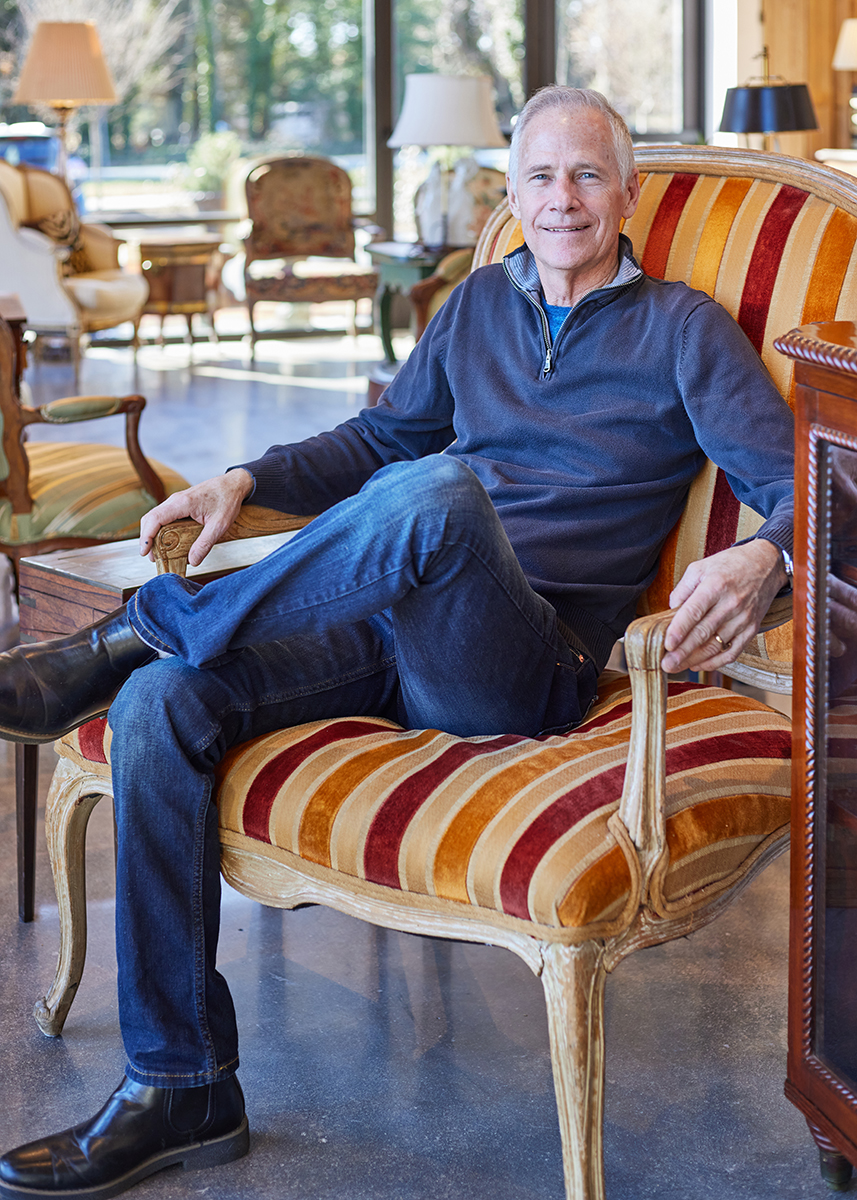Kenny Ball has been finding, buying, and selling European antiques for more than three decades. His showroom on Ivy Road is filled with beautiful furniture, furnishings, and decorative arts. You might assume a background of wealth and privilege…but the road that brought him here began with a pony.
“I didn’t grow up with these things,” Ball says, gesturing at the antiques around him. He was born and raised on Maryland’s Eastern Shore, in a family of farmers and watermen—“a humble home,” in his words. “But I like pretty things, and I was smart enough to expose myself [to a wider world], through the people I met.”
The pony was a childhood gift from his parents, and horses became his passion. Ball, who’s “been Kenny all my life,” started going to horse shows around the Mid-Atlantic, and through the friends he made in that circuit began attended local auctions. He picked up a few items of furniture, and soon was selling them as well.
By the 1980s, Ball’s involvement in the horse show world brought him to Albemarle County. His growing interest in antiques led him to the Country Store Antique Mall in Ruckersville, where he shared a booth upstairs and became friends with owner Jean Voight. The next step was a shop called Dovetail Antiques on Water Street in Charlottesville, where he partnered with Voight for the first year. “That was my first real shop,” he recalls.
Soon he was scouting major antique shows, including the Greensboro Super Flea Market, where he met well-known dealer Caroline Faison—“one of the most important people in my life.” Soon he was accompanying Faison on her shopping trips to Europe, learning more and more about European antiques and décor—“I was absorbing like a sponge,” he recalls. Through those shows and others, he met more people in the antiques and design world—Bunny Williams, Charlotte Moss, and Victoria Hagan among them. Gradually, Ball began to focus on furniture and furnishings from the English, French, and Italian 18th and 19th centuries: “It’s just what I discovered that I like, although it also has to do with the people I’ve met.”
By the early 2000s, Ball had moved into a larger space on Ivy Road, and Kenny Ball Antiques was well known in Virginia and the Mid-Atlantic. Then came the recession of 2008-2009. “We weren’t selling anything,” he recalls, “and a longtime employee said, ‘You’ve been doing design work [advising clients on what to buy and how to use it in their homes]—only you haven’t been charging for it.’” So Ball began consulting with local architects, and grew a separate retail design business that now has its own full-time staff, showroom, design library, and CEO—his daughter Chloe.
Navigating the pandemic has not been as challenging. Being homebound turned many people’s thoughts to redecorating, and with the explosive growth of Instagram, Kenny Ball Antiques does a large portion of its sales online. Buying antiques sight-unseen might seem like a risky business, but Ball is careful both in describing his offerings and in assuring his clients that no sale is complete until they are satisfied. “I’ve worked hard on my reputation,” he says. “The only customer I want is a happy customer.” (Another side effect of Instagram: “We’re seeing more younger people.”)
In the last year, Kenny Ball Antiques has moved from Ivy Square to a larger, light-filled showroom next to the Market at Bellair. People often come to stroll around and look at the pieces, without buying anything—which is fine with him. “I love having a shop because of the relationship I build with my customers,” he says. And many of those customers have been coming—and buying—for decades.
What brings people in? Ball says his customers are drawn by his style—he knows and loves European antiques, but he has the ability to combine them with objects from other periods. “The market here [in the Charlottesville area] is very broad, and my customers are eclectic—and I like to mix it up.” In his showroom, Ball’s personal favorites (“the Directoire period—I like straight lines, good Georgian, things that never go out of style”) co-exist comfortably with more ornate inlaid and painted furniture, Chinoiserie decorative items, some primitives, and contemporary graphic arts.
Any advice for those just beginning to consider antiques? “Buy what you love,” says Ball without hesitation. “And buy it when you see it—the piece may not be there when you come back.” Those rules have stood him in good stead over his career—“and after 35 years, I still love coming to work.”
